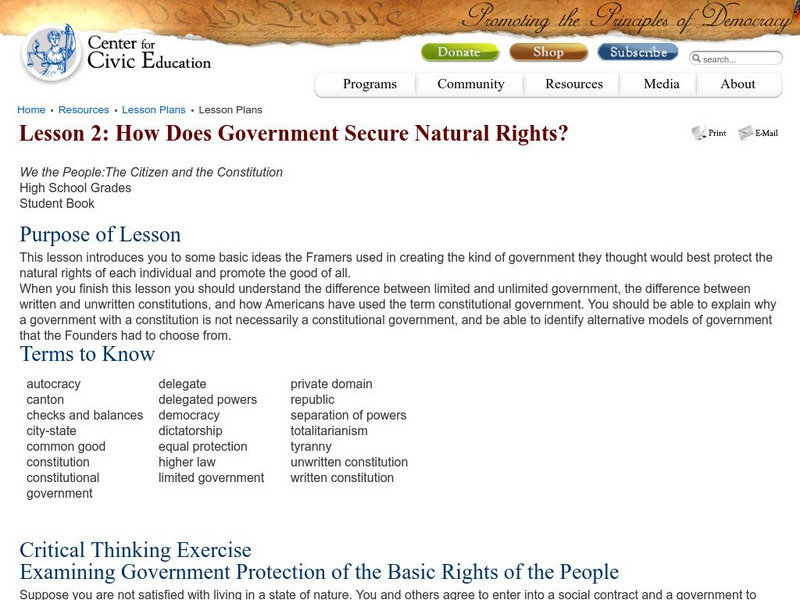Hi, what do you want to do?
Curated OER
Soybeans in Space
Students work together to design an experiment that compares and contrasts differnet plant cultivation systems. In groups, they evaluate the results of the experiment to discover if the cultivation system could be used in space. They...
Curated OER
A New, Capital Idea#141
Students design a pamphlet which explains where a capital for a new country, which is comprised of the New England region, should be located. They include the reasons for their decision based on where physical and human features are...
Curated OER
Who's Town is This, Anyway?
Fifth graders work in cooperative groups to simulate a town government as they consider an important change in their community growth. They analyze a real problem in the community and then determine their goals to fix it and make a...
Curated OER
Wartime and the Bill of Rights: The Korematsu Case (Lesson 2)
Twelfth graders review how the government and Bill of Rights came into effect. Using primary source documents, they discuss if Japanese rights were violated when they were placed in internment camps after the bombing of Pearl Harbor. ...
Curated OER
FDR-Hitler: Conflicting Political Systems
Students compare and contrast the governments of the United States and Germany during World War II. Using different media, they identify the actions of both countries during the war and their major mistakes. They write a short summary...
Curated OER
Hatchet Job
Students explore the difference between temperance and prohibition. After reading a story, students explore the difference between a vigilante action and a protest. They explore social and political factors that may cause social...
Curated OER
Michigan Court System (Part 1) (Middle School)
Students identify the courts that make up the Michigan judicial system. They explore the responsibility of each court and diagram how cases move to the Supreme Court. They compare and contrast the different types of courts.
Curated OER
Michigan Judicial System Conclusion
Students identify the courts that make up Michigan's judicial system. They state the responsibilities of each court and diagram a flow chart of how a case moves to the Michigan Supreme Court. They participate in a quiz about the current...
Curated OER
What's in the Water?
Students examine the Clean Water and Safe Drinking Water Acts. Using the text, they identify examples of how the federal and state governments implement public policy. They discuss how citizens can make sure that all levels of government...
Curated OER
Introduction to Mediation
Students are introduced to the use of mediation in court cases. In groups, they identify the different scenerios that could mediation could be used and discuss other alternatives to a solution. They practice mediating various situations...
US National Archives
National Archives: Teaching Six Big Ideas in the Constitution
The Constitution can be broken down into 6 main themes: Limited Government, Federalism, Republicanism, Separation of Powers, Checks and Balances, and Popular Sovereignty. Students will study background on the Founding Fathers and use...
iCivics
I Civics: Constitutional Principles
The Founding Fathers created a government based on a set of fundamental principles carefully designed to guarantee liberty. This lesson lets students look at the Constitution from the perspective of its foundational principles and make...
iCivics
I Civics: Limiting Government
Explore the five basic limits on government through the true story of Peruvian president Alberto Fujimori, and other fictional cases of government power gone wild.
iCivics
I Civics: No Bill of Rights, No Deal
In the debate over the Constitution, the Bill of Rights was a deal-breaker. In this lesson, students learn why the federalists thought the Constitution didn't need a bill of rights and why the anti-federalists refused to accept the...
Center For Civic Education
Center for Civic Education: How Does Government Secure Natural Rights?
This lesson introduces students to some basic ideas the Framers used in creating the kind of government they thought would best protect the natural rights of each individual and promote the good of all. At the end of the lesson, students...
Center For Civic Education
Center for Civic Education: What Is the Role of the President?
The president has great power granted to him under Article II of the Constitution, while at the same time extensive limits have been placed to keep that power in check. This source contains extensive background on these powers and...
iCivics
I Civics: Mini Lesson: Pardon Power
Lesson teaches about presidential pardons, commutations, and the limitations of these powers.
The Dirksen Congressional Center
Congress Link: Teaching the Amendments Lesson Plan
This online lesson plan teaches students "The amendments to the Constitution through the use of CongressLink, Internet resources, and creative activities." Students will also gain a sense that "Many rights are limited and controversial."
PBS
Structure of Congress and the Legislative Process Lesson
This instructional activity explores the structure of Congress and the legislative process. There is an introduction, a research activity, an assessment, and a role play activity.

















